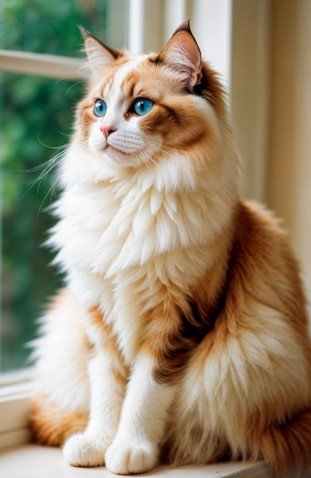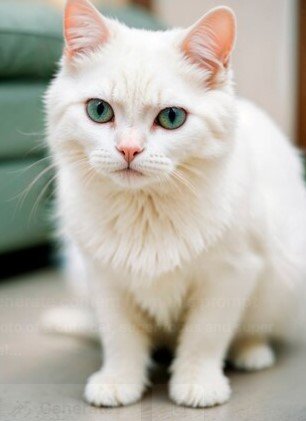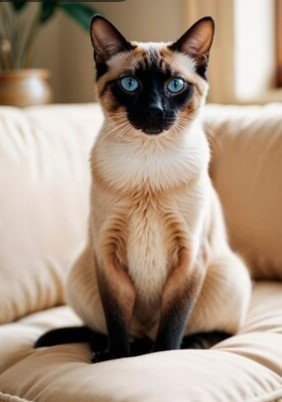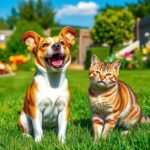Introduction
Cats have been loved by people for centuries. They bring joy with their playful ways and soothing sounds. In the USA, more and more families are welcoming cats into their homes. If you’re thinking of getting a cat, knowing the best breeds is key.
This article looks at the top 5 cat breeds for pets in the USA. We’ll dive into their traits, care needs, and how well they fit into family life.
Understanding Cat Breeds
Every cat is unique, with its own personality and needs. Things like size, grooming, playfulness, and how they get along with others matter a lot. We’ll explore five top breeds that are great for families and individuals.
1. Maine Coon

Overview
The Maine Coon is a big cat breed known for being friendly and social. They come from the USA and have a rugged look with tufted ears and a shaggy coat. They’re called “gentle giants” because of their size and loving nature.
Characteristics
- Size: Maine Coons can weigh between 10 to 25 pounds.
- Temperament: They are friendly, playful, and smart. They get along well with kids and other pets, making them great family pets.
- Lifespan: They live for 12 to 15 years, sometimes longer.
Care Requirements
- Grooming: They need regular grooming because of their long fur. Brush them 2-3 times a week to avoid mats and reduce shedding.
- Diet: Feed them a high-quality diet that fits their size and activity level. They might need more food because of their size.
- Exercise: Keep them active with toys, scratching posts, and climbing structures.
Ideal Home Environment
Maine Coons do well in family settings and enjoy being part of the action. They’re adaptable and can fit into different homes, from apartments to big houses.
2. Ragdoll
Overview
The Ragdoll is famous for its blue eyes and loving nature. They are gentle and go limp when picked up, earning their name. Ragdolls are big, soft, and very loving, making them perfect companions.
Characteristics
- Size: Ragdolls weigh between 10 to 20 pounds.
- Temperament: They are very affectionate and laid-back, often acting like dogs by following their owners and joining in family activities.
- Lifespan: They live for 12 to 15 years.
Care Requirements
- Grooming: Brush their fur twice a week to prevent tangles and mats.
- Diet: A balanced diet is key for their health and coat. Choose high-quality cat food with lots of protein.
- Exercise: They enjoy gentle play with toys, as they are less active but love to play.
Ideal Home Environment
Ragdolls like a calm place and are good for families with kids or seniors. They love being around people and shouldn’t be left alone for too long.
3. Siamese
Overview
The Siamese cat is famous for its striking looks and sleek body. It has color points on its ears, face, paws, and tail. Siamese cats are very vocal and love to talk to their owners, making them great friends.
Characteristics
- Size: Siamese cats usually weigh between 6 to 14 pounds.
- Temperament: They are social, vocal, and loving, often forming strong bonds with their owners. Siamese cats are playful and curious.
- Lifespan: They live for 12 to 20 years on average.
Care Requirements
- Grooming: Their short coat needs little grooming; a weekly brush is enough to remove loose hair.
- Diet: A high-quality diet is key to support their active lifestyle. Make sure they always have fresh water.
- Exercise: Siamese cats are energetic and love to play. Give them lots of toys and play with them every day.
Ideal Home Environment
Siamese cats do best in homes where they can be active and interact with their owners. They love to join in on family activities and seek attention from everyone.
4. Bengal
Overview
The Bengal cat looks like a small leopard with its wild coat patterns. Bengals are full of energy, playful, and curious, adding fun to any home.
Characteristics
- Size: Bengals weigh between 8 to 15 pounds.
- Temperament: They are smart, active, and love to explore. Bengals are often called “dog-like” because of their playful nature.
- Lifespan: They live for 12 to 16 years on average.
Care Requirements
- Grooming: Their coat needs little care and can be brushed every few weeks to remove loose hair.
- Diet: A diet rich in protein is best for their high energy. Choose premium cat food that meets their needs.
- Exercise: Bengals need lots of physical activity. Provide cat trees, climbing structures, and toys to keep them busy.
Ideal Home Environment
Bengals love active homes where they can play and explore. They need vertical space to climb and perch, so homes with cat trees or shelves are perfect.
5. British Shorthair
Overview
The British Shorthair has a round face, dense coat, and a calm nature. This breed is affectionate and makes a wonderful companion for families and individuals.
Characteristics
- Size: British Shorthairs weigh between 9 to 18 pounds.
- Temperament: They are calm and easygoing. British Shorthairs are independent but love spending time with their families.
- Lifespan: They live for 12 to 20 years on average.
Care Requirements
- Grooming: Regular brushing is needed to reduce shedding, ideally once a week.
- Diet: A balanced diet is essential to keep them healthy and at a good weight. Watch their food intake to avoid obesity.
- Exercise: Engage them in gentle play and provide toys that encourage slow play. They enjoy interactive toys and scratching posts.
Ideal Home Environment
British Shorthairs are adaptable and can thrive in various homes, from small apartments to larger houses. They are great for families and prefer a calm environment where they can relax.
Comparison Chart
| Cat Breed | Size | Temperament | Grooming Needs | Ideal Environment |
|---|---|---|---|---|
| Maine Coon | Large | Friendly, Sociable | Moderate (weekly) | Family homes |
| Ragdoll | Large | Affectionate, Calm | Moderate (bi-weekly) | Quiet homes |
| Siamese | Medium | Vocal, Social | Low (occasional) | Active households |
| Bengal | Medium-Large | Energetic, Curious | Low (occasional) | Active environments |
| British Shorthair | Medium | Calm, Easygoing | Moderate (weekly) | Quiet homes |
Additional Considerations for Petting Cats

When adopting a cat, it’s essential to consider the following:
1. Adoption vs. Breeders
- Consider adopting from local shelters or rescue organizations to give a homeless cat a second chance.
- If choosing a breeder, ensure they are reputable and prioritize the health and wellbeing of their cats.
2. Socialization and Training
- Early socialization is key, for breeds like Siamese and Bengal, which thrive on interaction.
- Use positive reinforcement techniques for training, such as treats and praise.
3. Health Care
- Regular veterinary check-ups are vital for maintaining your cat’s health.
- Keep their vaccinations up-to-date and consider spaying or neutering.
4. Environmental Enrichment
- Cats need mental and physical stimulation. Provide scratching posts, cat trees, and toys to keep them engaged.
- Consider setting up a safe outdoor space or catio for fresh air and exploration.
5. Understanding Cat Behavior
- Learn to recognize your cat’s body language to understand their needs and feelings.
- Respect their personal space and allow them to approach you on their terms.

Conclusion
Choosing the right cat for your home is rewarding and can lead to years of companionship and joy. Each breed, like the Maine Coon, Ragdoll, Siamese, Bengal, and British Shorthair, has unique traits and care needs. They are some of the best pets in the USA.
By understanding their traits and requirements, you can make an informed decision. This will benefit both you and your future feline friend.
As you look for the perfect cat, remember to consider adopting from shelters. Provide a loving, nurturing environment. Whether you prefer a playful Ragdoll or a majestic Maine Coon, a cat can bring joy and companionship to your life.
If you have any further questions or need more information, feel free to ask!
Sources
- American Kennel Club
- The Cat Fanciers’ Association
- PetMD





Leave a Reply